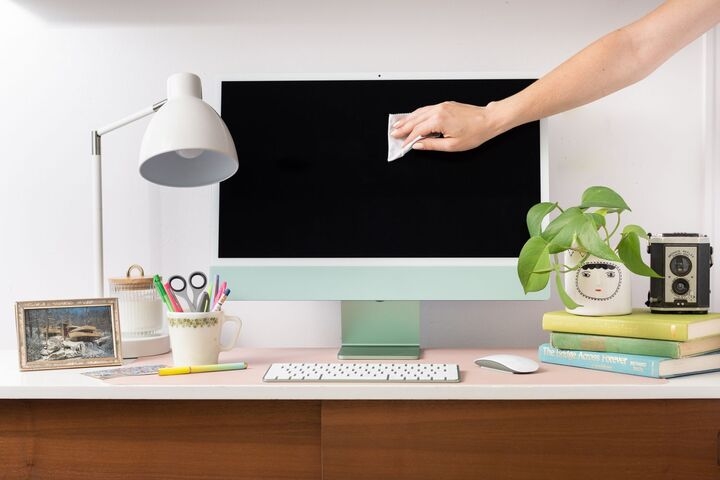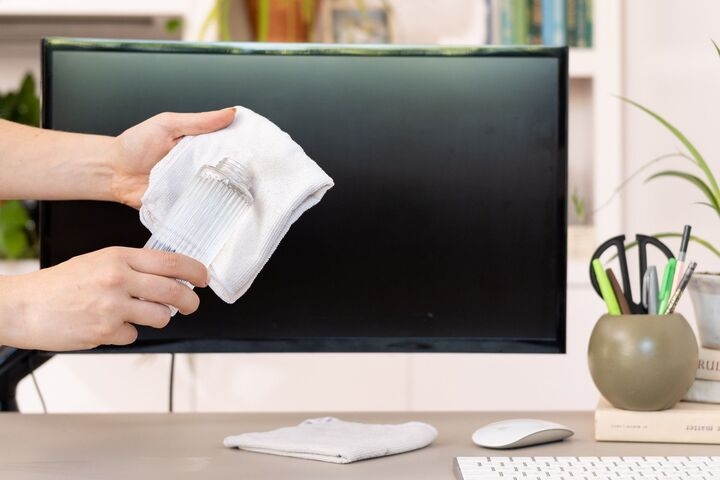Cleaning your TV screen is essential to ensure crisp and vivid images, not only enhancing your viewing experience but also protecting your eye health. However, it’s crucial to clean your TV screen properly to maintain image quality and the device’s longevity.
Why You Shouldn’t Use Paper Towels to Clean Your TV Screen
Out of convenience, many people use paper towels to clean their TV screens, unaware that this habit can be detrimental.
According to electronics experts, modern TV screens, especially LED, OLED, or LCD models, have a more complex and sensitive structure than older TVs. The protective screen layer is usually coated with an anti-reflective and scratch-resistant coating to improve viewing. However, this coating is very thin and fragile if not properly maintained and cleaned.

Electronics experts advise against using paper towels to clean TV screens. (Image: The Spruce)
Using paper towels to wipe your TV screen can inadvertently damage this coating. While paper towels may feel smooth, they are not sufficiently soft and can leave tiny scratches on the screen’s surface. Initially, you might not notice these scratches, but over time, the screen may become cloudy or develop visible scratches that degrade image quality.
Additionally, paper towels can leave tiny pieces of lint behind, making the screen appear dirtier than before cleaning.
This is especially true when attempting to clean sticky messes like fingerprints or grease from the screen. Paper towels are often not effective enough to remove such stains and may end up spreading them, causing the TV screen to become cloudy and difficult to view.
Some paper towels are also treated with chemicals to enhance softness or absorbency. These chemicals can cause yellowing or haze on the anti-glare coating when they come into contact with the TV screen, affecting the TV’s appearance and reducing screen lifespan. This is why you should avoid using paper towels to clean your TV screen.
To keep your TV screen clean and scratch-free, it’s recommended to use a soft cloth or a specialized cleaning cloth. There are various screen-cleaning solutions on the market designed not to harm the protective coating of your screen. You can purchase one of these solutions and use it with a soft cloth. Do not spray directly onto the screen to avoid liquid seeping into the TV’s crevices.
Instead, spray the solution onto the cloth and then gently wipe the TV screen.

To maintain a clean TV screen, invest in a soft cloth or a specialized cleaning cloth. (Image: The Spruce)
Experts advise turning off the TV and allowing the screen to cool completely before cleaning to prevent screen cracking due to sudden temperature changes.
While it’s important to clean your TV screen regularly, avoid doing it too frequently. Overcleaning can lead to premature screen wear due to repeated friction. Only clean the screen when it’s visibly dusty or dirty.
The Right Steps to Clean Your TV Screen
Once you have your cleaning cloth and solution ready, follow these steps to properly clean your TV screen:
Turn off and unplug the TV before cleaning
Unplugging the power source ensures safety and protects against electrical shocks or explosions during cleaning. Additionally, when the TV is turned off, you can more easily spot and thoroughly clean any dirt or stains on the screen.
Clean the screen
Prepare a container and pour an appropriate amount of cleaning solution into it. Dip a soft cloth into the solution, wring it out, and then gently wipe the TV screen.
For screens with regular dust buildup, wipe in a zigzag pattern from the right edge to the left and vice versa. If the screen is stained with fingerprints or if the zigzag pattern leaves streaks, wipe in a circular motion, moving from one edge of the screen to the other, from top to bottom, until the entire screen is clean. You can apply gentle pressure to remove stubborn stains.
Clean the rest of the TV
Use a soft cloth or a regular dusting cloth to clean the plastic frame, stand, body, and remote control of your TV. These parts are made of hard plastic, a less sensitive material than the screen, so they don’t require specialized cleaning solutions.
According to VTC News
































